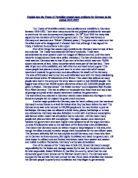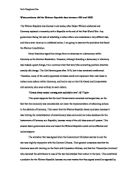Despite the faults it exposed, however, the Kapp putsch’s overall significance – just within itself – was slight. The general strike called in order to stop Kapp ended in Berlin as soon as he fled power, the General von Seeckt, who had adamantly refused to allow 'Reichswehr [to] fire on Reichswehr,’ or genuinely aid Ebert, was soon appointed chief of army command, and the judiciary was surprisingly lenient toward all those involved in Kapp’s right-wing revolt, finding guilty only one of 705 prosecuted[1].
Kapp and Luttwitz evaded justice (the former perished awaiting trial, the latter granted early retirement) but what rose after Kapp’s flight was perhaps just as dangerous as his putsch;
The Red Rising in the Ruhr, 1920 – an attempted communist revolution begun by workers in several parts of Germany, who boasted much support, large numbers, and bold intentions.
Nonetheless, when the government dispatched the Freikorps, it became evident that Red Army communists were simply no match. However, after using the Free Corps to brutally suppress the Red rising[3] (as they had in previous communist cases eg. The Spartacists) the government simply disbanded them.
Brooman suggests that this was the reason why the Freikorps formed large ‘murder squads’ and, between 1921 and 1923, went on to assassinate 356 socialist and communist politicians[3] as they still desired the elimination of communism and its followers, despite the government having no more use for them.
Those killings were knock-on effects of the Red rising in the Ruhr, which was, arguably, triggered in turn by Kapp’s putsch. This a point supported by Hulse, who writes that it was ‘the circumstances surrounding the Kapp Putsch that gave the German communists their moment of choice’ –suggesting that had it not been for the Kapp Putsch, the German communist groups may have lain dormant a little while longer, or, perhaps, not have risen at all.
During this time period, as much of an ‘insidious threat’[1] the rightwing was, much greater mind was paid to the less powerful and less advantaged left. That was perhaps the reason why the communist and socialist revolts seemed to cause more trepidation amongst the German people, and had less support from the middle and upper classes, who were aware of the changes the Bolsheviks of Russia (the communists) had made since overthrowing their Tzar, and feared the same sort of communism might spread to Germany[3]. Many Germans, by 1919, were very much in favour of Ebert and his plans[3], for, in the past year, he had made numerous well-liked and beneficial changes – he ended censorship, allowed free speech, introduced an eight-hour working day, helped the unemployed, and increased food supplies[3]; even some members of the working class supported Ebert, over what would have been expected of them – the communist Spartacus League[3], who refused to enter elections[1] and instead led a revolt against Ebert that very year.
Although they had had a low chance of success from the start[1], lacking arms and fighters, and facing a 4000-strong force of Freikorps, the Spartacists’ rising set an example and carved a path for further communist revolts to come[5] (the Worker’s Councils, the Red Army in the Ruhr) – and was thus also a contributor to the instability present between 1919 and 1923.
However, also to be considered, is the fact that all of these risings and putsches occurred beneath the shadow of something much greater – the diktat, the schmachfrieden, the ‘shameful peace’[1] – despised by the right-wing, and unpopular with the German people and the left too–
The Treaty of Versailles.
Presented as a peace treaty to Germany in 1919, the Treaty of Versailles led to great political and economic instability, as the government was seen, by many, as having surrendered to the dictation of France, Britain and America. Forcing the huge submission of Germany's land, resources, and military capability, the Treaty certainly played an important role in causing the political and economic instability witnessed during 1919-23. Moreover, it was arguably the greatest reason for it.
The Treaty demanded £6600million in reparations for the war, the disarmament of the German army – permitting only 100,000 soldiers, with no tanks, big guns, or aircraft. 13% of the land was also taken, 12% of the population, 15% of agricultural produce, and 48% and 15% of iron ore and coal production, respectively.
The arrangement was thought of as a Diktat – a ‘dictated peace’ – and a Schmachfrieden – similar, only shameful too – and was unpopular amongst the German people.
The right wing politicians there forth detested ‘the ‘November criminals’ for signing the treaty[5],’ and left wing politicians ‘hated’ the Weimar government anyhow, for not fitting their communist ideal. The treaty itself also demanded crippling sums of money, huge areas of industrial land, and forced all war guilt upon Germany.
It was the reason why the right wing despised and sought to overthrow the government, the Weimar’s views and actions were why the left wing so strongly opposed it, and, as much of the other instability at the time was caused by economic factors-
(eg. The Invasion of the Ruhr → strikes, printed more banknotes to pay workers → hyperinflation , which began with a lack of money, and inability to pay off the reparations, and also because Germany were unable to attack and evict the French Troops because of their ‘severely cute’[3] army → also due to the terms of the Treaty.)
-a conclusion can be drawn that the existence of the Treaty of Versailles was what caused much of the instability in Germany between 1919 and 1923.
Even the Kapp Putsch was, indirectly, a result of this – the Kaiser was gone, and the government had surrendered to Britain, France, and America. Kapp, Luttwitz, Ludendorff and their supporters believed that this government was inadequate, and wished for a constitutional monarchy[1]. This they tried to gain through the Kapp Putsch.
The Kapp Putsch, in turn, led to the Red Army rising in the Ruhr at an opportune moment. The Red Army was defeated by the Freikorps, who were later disbanded and went on to murder numerous socialist and communist politicians – many of the most significant events that occurred, and caused widespread instability, can be linked back to the existence of the Treaty of Versailles, and the impact it had on Germany – the Kapp Putsch being one of them.
Therefore, although the Kapp Putsch did indeed halt the workings of Germany for a time (with the general strike), and was arguably a trigger for other high-profile events (the Red Rising, Ludendorff’s participation later on, in the Munich Beer Hall Putsch of 1923, alongside Adolf Hitler), and was therefore undoubtedly a cause of some instability – the Kapp Putsch was linked almost entirely to the right wing’s general hatred of the ‘November Criminals.’ The ‘November Criminals’ who signed the Armistice of 1918. The same November Criminals who agreed to the Treaty of Versailles.
To conclude, the Kapp Putsch was a reason for instability in Germany between 1919 and September 1923, but it was not the sole, nor the main, cause. The Kapp Putsch would never have occurred had the right wing politicians not so disliked the government, and the government would not have been so disliked by the right, had they not signed the Treaty of Versailles and agreed to those crippling terms.
PACK SOURCES,
- Treaty of Versailles – Reparations (Dawes Plan, borrowing money from America), Territory (Locarno Pact), however it made him unpopular with the nationalists (?) Germany also ended up relying very much on America, which was a massive problem later on, due to the wall street crash. This, however, could not have been predicted (by Stresemann) at the time. For that moment, the decisions he made as foreign minister were good, and gave Germany a better global standing and improved international relations.
- Hyperinflation – Sent the French from the Ruhr and made the ___ pact, introduced the Rentenmark (300 million of the old mark) in order to create a more stable currency. DID THIS MAKE HIM UNPOPULAR?? No, not really, I don’t think. But I will check. If so write about it here. Hyperinflation’s end brought strength and economic stability to Germany. Other countries would respect it more. Sending the French away from the Ruhr ensured Germany’s people were sort of working properly again. They would not only be able, but also want to. Many workers thankful to Stresemann (I’m guessing)
- Left and Right Wing Risings – (whatever he did with those. Write about it) Opinions amongst the people regarding his actions. Munich Beer Hall Putsch, the nationalists’ & right wing’s dislike of his foreign policies, BUT Layton, ‘1924 to 29 played hugely in his favor’ and extremist parties were not able to gain support as the majority of people were happy with the government and what Stresemann had done in regards to the hyperinflation/rentenmark and unemployment.
-
Other stuff – Winning Nobel Peace Prize (those around the world believed he was strengthening Germany), entry into the League of Nations (was respected again, and also accepted; showed Germany was recovering. Also showed that Stresemann had been successful in taking Germany from the “loathed perpetrators” of World War One to a respected, stable nation) etc. if anything else ☺
- Conclude: Stresemann was successful. The real reasons for Germany’s collapse was the Wall Street Crash of 1929 (following his death(?) and the rise of the Nazis (who used the poverty and squalor brought forth by the Wall Street Crash and the fact that Germany had to pay a load of money to America. Thus a little product of the WSC) the WSC could not have been predicted at the time that Stresemann decided to borrow from America, as it was before the market started it’s ‘up-up-up’ gig, and also (apparently) after his death, and was not his fault. The threats of the left and right were omnipresent, but suppressible, he dealt with them, no putsch overthrew him (that just says it all, really.)
- He was successful because – Germany’s economic state was stabilized, the extremist groups weren’t showing up all the time, Germany was accepted internationally, and was BASICALLY A FAR CRY FROM WHAT IT WAS BEFORE (hyperinflation, French in the ruhr, hyperinflation, reparations, no money, burning banknotes, nobody has a job etc)
- YAY STRESEMANN (I hope that’s everything down)
[1] Weimar and the Rise of Nazi Germany 1918-23, Geoff Layton
[2] , Chris Trueman
[3] Germany 1918-45, Josh Brooman
[4] The Forming of the Communist International, James W. Hulse
[5], John D Clare








